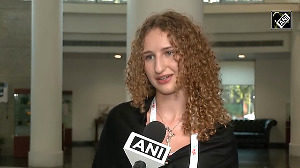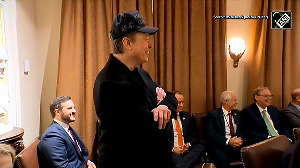India received two distinct kinds of visitors this past fortnight: US Deputy Secretary of State Richard Armitage, on an official mission; and 13 Pakistani members of parliament (MPs), from different parties, carrying a non-official mandate.
The first visit highlights divergences between New Delhi's and Washington's priorities. The second has generated optimism among citizens and underscores commonness between India and Pakistan --despite a slowing of the pace of improvement in relations which began with Prime Minister Vajpayee's "hand of friendship" offer a month ago.
Thereby hangs a tale. The key to improved state-level relations may partly lie in citizen-to-citizen exchanges. US mediation, by whatever name, is unlikely to ensure peace, especially a just peace, between India and Pakistan.
During his sub-continental visit, Mr Armitage goaded India and Pakistan to take confidence-building measures and draw up a "road map" for a bilateral dialogue. He also delivered a message: it is up to "India to make up its own mind" on whether President Pervez Musharraf is fulfilling his promise of ending "cross-border" terrorist infiltration.
During his five official meetings in New Delhi, he said the US won't intercede with Pakistan, or use an economic "squeeze", to ensure that it lives up to that commitment. He also said that the onus of how to assess "progress" on infiltration and how to respond is on India. This is in contrast to June 2002, when Mr Armitage conveyed a solemn assurance by Gen Musharraf that cross-border terrorism would be ended "permanently" and "verifiably", following which India permitted overflights by Pakistani aircraft. This eventually led to troop demobilisation.
This time too, Indian officials expected that Mr Armitage would offer to play a pro-active role on the terrorism issue. When they suggested to him that Pakistan has adopted a dual approach to terrorism --that of cooperating with the US against Al Qaeda, but obstructing India's struggle against groups like Lashkar-e-Tayiba -- he emphasised that Gen Musharraf is himself vulnerable to groups like LeT, which is rabidly anti-US too.
Mr Armitage also remained unmoved by the argument advanced by Deputy Prime Minister L K Advani that the US can put effective pressure on Pakistan because that country is highly "dependent" on it.
He refused to discuss Indian claims about cross-border interceptions in recent months. But he did convey the US's keen interest in India-Pakistan rapprochement.
There is reason to be far more upbeat about the Pakistani MPs' visit than Mr Armitage's. The MPs crossed the Wagah border to a rousing welcome. It's rare for that border-post to witness signs of
India-Pakistan friendship. In fact, twice a day, it becomes the site of a bizarre ritual.
As the two national flags are raised and lowered at dawn and dusk, the gates, separated by a small strip of no-man's-land, are opened in a perfectly synchronised, and well-rehearsed, sequence of goose-steps. Ceremonially dressed mustachioed guards of India's Border Security Force and Pakistani Rangers march with a swagger, and through rooster-like movements, display machismo, anger and hostility as they throw open the gates. The spectators cheer their side -- and condemn or parody the other. Sometimes, members of families separated by Partition get within handshaking distance of each other, across a fence.
The Pakistani visitors met a number of Indian MPs, especially from the Left, the Congress, the Samajwadi Party and the Rashtriya Janata Dal. They also interacted with scholars, journalists, artists and representatives of citizens' groups which advocate India-Pakistan reconciliation. Their visit has produced remarkable goodwill -- and hopes of better mutual understanding. It is likely to be reciprocated soon by Indian MPs. One hopes that such exchanges will snowball and lead to freer "cross-border" people-to-people interaction.
The MPs' visit, organised by the Pakistan-India Peoples' Forum for Peace and Democracy, was itself the culmination of a number of citizens' initiatives launched more than a decade ago amidst soured state-to-state relations following the outbreak of the azaadi movement in the Kashmir valley. Citizen-to-citizen interaction took an organised form in 1995 when the India-Pakistan Peoples' Forum was launched at a conference in Delhi, attended by over 100 delegates from each country. The Forum is a composite body and has Indian and Pakistani co-chairpersons. Its members comprise social activists, teachers, trade unionists, human rights defenders, theatre-people, retired soldiers, writers, journalists -- citizens who believe that the two countries must peacefully co-exist. The Forum has held half a dozen conventions alternately at Pakistani and Indian venues.
It is a pity that the Indian government missed a chance to make a goodwill gesture towards the people of Pakistan by welcoming the MPs from that country. Had Mr Vajpayee agreed to meet the MPs personally, he would have created a tremendous impact among Pakistan's media and public. Lok Sabha Speaker Manohar Joshi was willing to invite the MPs to the Lok Sabha as observers. But the Ministry of External Affairs didn't "clear" the invitation. Besides, Mr Joshi would have to look over his shoulder at his super-hawkish Shiv Sena boss.
The value of personal interaction between Indians and Pakistanis cannot be overemphasised. It is a precondition for overcoming deep-rooted prejudices, removing suspicion and distrust, and improving mutual relations even at the state level. At least two, if not three, generations of Indians and Pakistanis have been taught to think of one another as evil and irredeemably hostile. Their textbooks vilify and
demonise each other. Many of them do not believe that normal interaction or friendship is possible between the two peoples. They expect nothing but prejudice and personal animosity if they were to visit "enemy" territory.
The reality is starkly different. Indians and Pakistanis get on extraordinarily well with one another at an individual level. Despite their different political evolution, the two societies share much in their culture, languages, music, literature, and in day-to-day interaction, gestures, even people's body language. This realisation, especially through personal experience, dramatically breaks down barriers which are essential to maintaining a permanent state of hostility. It can increase the trust and good faith necessary for fruitful negotiations between governments. That's why it is vital that the Pakistani MPs' visit is reciprocated by India. Under a SAARC agreement, MPs don't need visas to cross borders within South Asia. They should use this privilege to a worthy purpose.
The two visits, especially Mr Armitage's, should provoke some serious rethinking in New Delhi. It's now clear that India's best bet doesn't lie in trying to persuade the US to pressure Pakistan on the terrorism
issue. It lies in sustaining the post-April 18 momentum for a thaw. Indian policy-makers must not misread the nature of the US-Pakistan relationship and overestimate US leverage over Islamabad. The US needs Pakistan just as much as, if not more than, the other way around. America's mortal fear of Taliban-style fundamentalism -- September 11 was the biggest-ever attack on mainland US and exposed its
vulnerability -- makes it regard Pakistan as an indispensable ally against terrorism targeted at itself.
Pakistan has carefully divided or segmented its approach to terrorism by distinguishing between forces directed at the US, and those active against India, which can be influenced by its own agencies. It has gone out of its way in arresting and extraditing US-identified Al-Qaeda suspects, sometimes in breach of its own laws. The US is probably aware of this duality, but content to allow short-term considerations to
overrule doctrinal consistency on coherence. America also knows it isn't easy to bend Pakistan to its will. There are limitations to US power. For instance, Pakistan-US relations plummeted to their lowest point
after the 1998 nuclear tests, especially after Kargil and Gen Musharraf's coup. Even in that vulnerable phase, the US couldn't compel Pakistan to stop its covert operations in India.
It is when war threatened to break out, or escalate to the nuclear level, that the US intervened -- as in Kargil, and again in January and June last year. India would be disastrously ill-advised to create
another threat of war, or use nuclear brinkmanship, to get US attention. Such moves can easily spin out of control. It would be far wiser for India to try to reach a rapprochement with Pakistan in a spirit of
cooperation. In the unequal triangular India-US-Pakistan relationship, the US always gains when the India-Pakistan base is weak. Because India and Pakistan both court it, America wields tremendous clout over each of them.
Begging America to pressure Pakistan was the only "strategy" India used in the 15 years leading to Pokharan-II and Chagai. Indeed, India didn't hold even one round of talks with Pakistan on the nuclear issue. Yet, numerous sanctions under US law amendments (Pressler, Brown, etc.) couldn't compel Pakistan to abandon its nuclear programme. US pressure didn't work then. There's no reason to presume it will succeed today.
This situation can change only if India and Pakistan open their own lines of communication, and build on the post-April 18 opening. This isn't the best alternative. It's the only one. Therefore, both India and
Pakistan will do well to announce unilateral concessions, CBMs and steps to promote goodwill. It's in India's own interest that full communication links are restored. If India and Pakistan are to break the
present impasse, they will have to do more than they're doing today.






 © 2025
© 2025